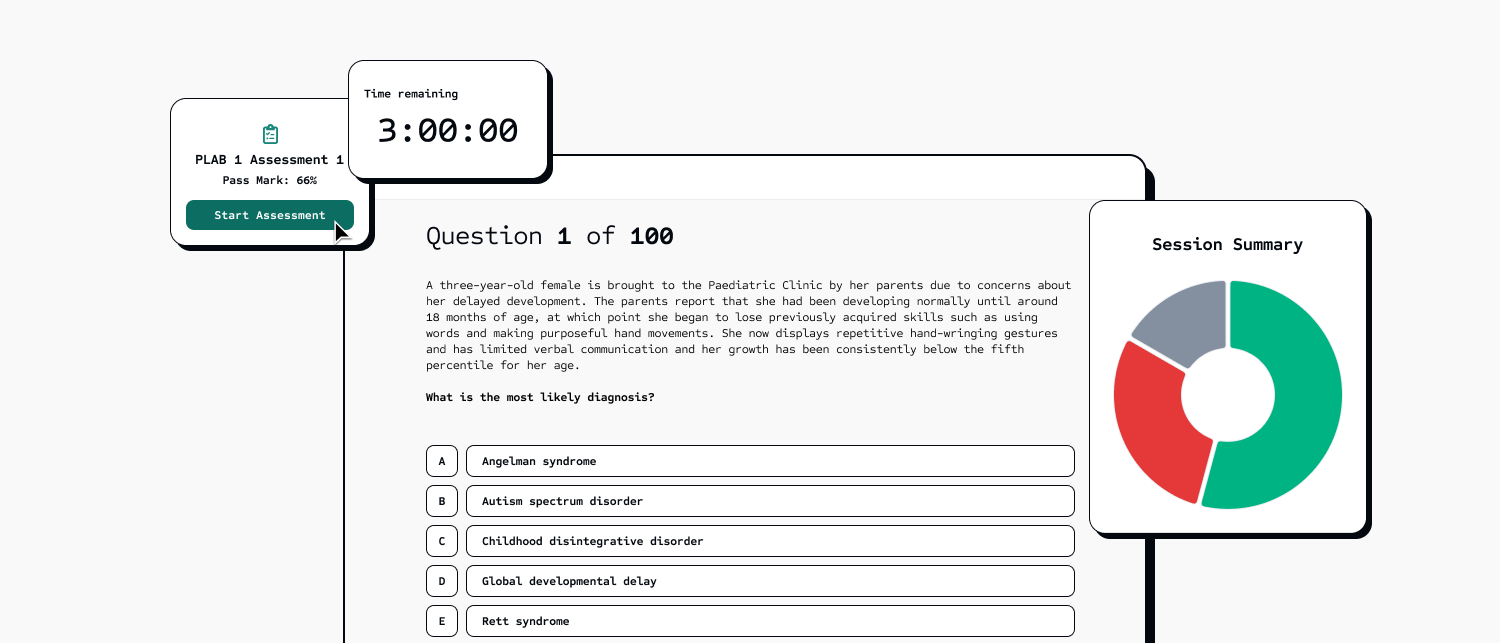Get Pastest's help at every step of your PLAB journey
PLAB 2
PLAB 2 is on the way - your next step is coming soon
The ultimate exam toolkit
Knowledge

Skills
Lessons
Community
Step One - IELTS or OET Exam
About the OET & IELTS
OET (Medicine) tests your English in medical contexts, like patient consultations and referral letters, while IELTS (Academic) is more general. Both are recognised by the GMC as proof you can communicate safely and effectively with patients and colleagues in the UK.
Learn moreThe exam formats
OET (Medicine) focuses on real healthcare scenarios, with listening, reading, writing, and speaking tasks tailored to medical contexts. IELTS Academic is broader, testing listening, reading, writing, and speaking in general academic and social contexts.
Learn moreHow to apply for OET
Register directly on the OET website, select your profession (Medicine), and book your test at an authorised test centre or via OET@Home (online).
Apply hereHow to apply for IELTS
Book through the IELTS official website, British Council, or IDP. Choose IELTS Academic, and select a convenient test date and location.
Apply hereRevision and preparation
Preparing for either exam can feel overwhelming, but you don’t have to do it alone. Our IELTS & OET Course, designed specifically for IMGs, gives you the chance to practise with real exam-style questions, sharpen your medical communication skills, learn proven strategies to maximise your score, and receive personalised feedback from experienced tutors - helping you feel confident and prepared to pass on your first attempt.
Explore nowStep two - PLAB 1 Exam
About PLAB 1
Before you can progress to PLAB 2, you must first pass PLAB 1, the written exam. It is a multiple-choice test designed to assess your ability to apply medical knowledge to the kind of scenarios you are likely to face as a junior doctor in the UK.
PLAB 1 exam format and content
PLAB 1 is a three-hour exam with 180 single best answer questions based on clinical scenarios. It focuses on common conditions in UK practice and safe patient management, following the GMC’s PLAB blueprint for doctors entering the NHS at Foundation Year 2 level.
Learn moreHow to apply for PLAB 1
To sit PLAB 1, you must first create an account on the GMC Online Services portal. Once registered, you can book your exam at an approved test centre in the UK or overseas, depending on availability. The exam is offered several times each year, so it’s important to plan ahead and secure your preferred date early. You will need to provide proof of your primary medical qualification and your English language test results when booking.
Revision and preparation
Preparing for PLAB 1 can feel challenging, but focused preparation makes a real difference. Our PLAB 1 6-month preparation access is built to help IMGs succeed, with high-yield question practice, exam strategy tips, and expert guidance so you can approach exam day with confidence and pass on your first attempt.
Explore hereStep three - PLAB 2 Exam
About PLAB 2
After passing PLAB 1, the next step is PLAB 2, the practical, clinical exam. This assesses your ability to apply medical knowledge in real-world clinical situations, testing communication, examination, and practical skills with simulated patients.
PLAB 2 exam format and content
PLAB 2 is an Objective Structured Clinical Examination (OSCE) made up of short stations that test your ability to take histories, examine patients, communicate clearly, and make safe clinical decisions. It focuses on common NHS scenarios to ensure you can deliver safe, effective care.
How to apply for PLAB 2
You can book PLAB 2 through the GMC Online Services portal once you have passed PLAB 1. The exam is held at designated test centres in the UK, with a limited number of seats, so early booking is recommended. You will need to provide proof of your PLAB 1 pass and meet all GMC eligibility requirements.
Revision and preparation
While we don’t currently offer a dedicated PLAB 2 preparation course, we are working on bringing one soon. In the meantime, familiarising yourself with OSCE-style scenarios, practicing clinical skills, and reviewing GMC guidance will help you approach the exam with confidence.


